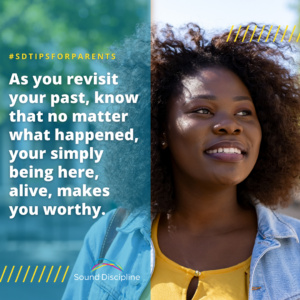 Our early experiences shape us in profound ways. If those experiences were persistently stressful or traumatic in your early life, you may suffer from the results of adversity, just like millions of other parents and caregivers.
Our early experiences shape us in profound ways. If those experiences were persistently stressful or traumatic in your early life, you may suffer from the results of adversity, just like millions of other parents and caregivers.
Dr. Bruce Perry and Oprah Winfrey teamed up on a new book titled What Happened To You? that illuminates how early adversity affects human beings. Many of us are caught up in blame and shame, and the authors point out that rather than asking, “What is wrong with me?” or “What is wrong with you?” we should shift the question to ask instead, “What happened to me?” Or “What happened to you?” The compassion generated from that shift can open the door to healing and allow us to look at ourselves and our parenting differently.
Here are some of the most useful passages from the book that can be helpful to parents and caregivers:
Be curious and compassionate with yourself: Oprah asks, “Have you ever wondered ‘Why did I do that?’ or ‘Why can’t I just control my behavior?”… it’s easy to place the blame on ourselves; holding ourselves and those around us to an impossible standard.” But it is through recognizing and wondering about our patterned responses without judgement (there is scientific evidence to support self-compassion) that we will be able to unravel the truth of the impact of our early years. We recommend another book, Parenting from the Inside Out, by Dr. Dan Seigel, to explore this idea. As Oprah says, “As you revisit your past, know that no matter what happened, your simply being here, alive, makes you worthy.”
Know that if you have experienced adversity growing up, there is hope: Our brains are malleable and can always change. Though we cannot undo what has been done, Dr. Perry explains that through therapy, we can open new possibilities. It “is more about building new associations, making new, healthier default pathways. It is almost as if therapy is taking your two-lane dirt road and building a four-lane freeway alongside it. The old road stays, but you don’t use it much anymore. Therapy is building a better alternative, a new default.”
Nurture your relationships: “…your connectedness to family, community, and culture—is more predictive of your mental health than your history of adversity…. Connectedness has the power to counterbalance adversity.” Not only does the sense of belonging support and heal our brains and bodies, Dr. Perry explains that even if we have attempted to ease the pain of trauma with substance abuse, “Connectedness counters the pull of addictive behaviors. It is the key…The most powerful form of reward is relational. Positive interactions with people are rewarding and regulating. Without connection to people who care for you… it is almost impossible to step away from any form of unhealthy reward and regulation.”
Recognize your strengths: You have many. Some of them have come as a result of difficult early years. Oprah states, “…what I know for sure is that everything that has happened to you was also happening for you. And all that time, in all of those moments, you were building strength. Strength times strength times strength equals power. What happened to you can be your power.”
Join us for a conversation about What Happened to You? on December 6. We will talk about trauma, resilience and healing.
Here are some additional video resources for more information –
Dr. Nadine Burke Harris’ TED talk
Adverse Childhood Experiences (ACEs): Impact on brain, body and behaviour
